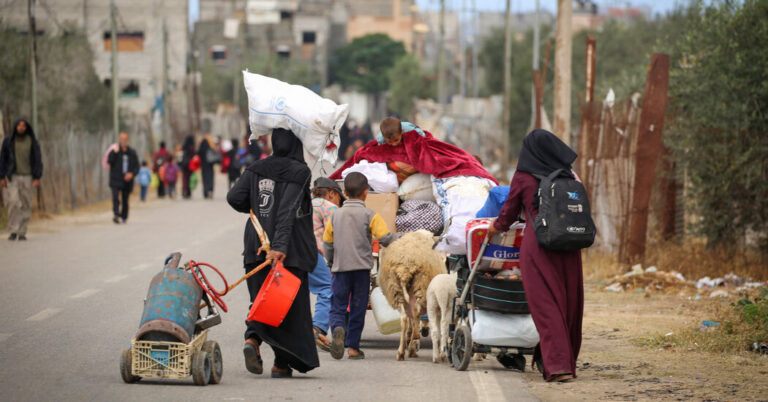After the Israeli military issued its evacuation order, British Prime Minister Rishi Sunak reiterated that he remained “deeply concerned” about an invasion, while the Saudi Foreign Ministry warned Israel against continuing of what he called a “bloody and systematic” campaign to storm the entire territory. Gaza and displace its inhabitants.
In Rafah, under pouring rain, some Palestinians quickly dismantled their tents and began to leave. Others wondered if it was safe to leave. Gazans and humanitarian groups said the Israeli army had bombed areas it had previously designated safe for civilians.
Nidal Kuhail, 29, a former resident of Gaza City, said he was overwhelmed with anxiety and divided over what he should do. The tent he was sheltering in was not in the Rafah area covered by Israel’s evacuation order.
“If we have to leave, we will enter the unknown,” Mr. Kuhail said. “Are we going to have a place to go?” Will we be able to find a place to set up the tent?
Workers at UNRWA, the main United Nations agency helping Palestinians in Gaza, estimated Monday that about 200 people were fleeing the evacuation zone per hour, said Sam Rose, the agency’s planning director. .
Israel was telling Palestinians to move to an area that includes al-Mawasi, a coastal part of Gaza where it has been advising people to go for months, as well as areas further north along the coast to Deir al -Balah. The army said the area had field hospitals, tents and larger supplies of food, water and medicine.
Israel was not calling for a “large-scale evacuation from Rafah,” a military spokesman, Lt. Col. Nadav Shoshani, said Monday. “This is currently a very specific large-scale operation aimed at getting people out of danger.”
But Mr. Rose said the area would not be able to safely house all the civilian refugees in Rafah, in part because parts of the area are littered with unexploded bombs.
Getting there would also take them further away from entry points for desperately needed food, water, medicine and other supplies, which humanitarian agencies have struggled to distribute around Gaza.
“They would basically go back into oblivion,” Mr. Rose said.
Mahmoud Mohammed al-Burdeiny, 26, said he believed Israel had used the threat of an invasion of Rafah as a bluff to get a better deal from Hamas in ceasefire negotiations. But now the danger seems real, he says.
So Mr. al-Burdeiny and his wife began packing their belongings and preparing for the worst. They could take the doors of their house with them for shelter, they realized. And they could dismantle their furniture to use it for firewood.


